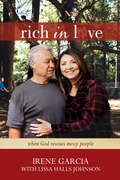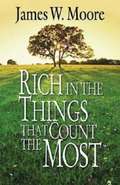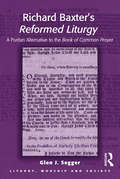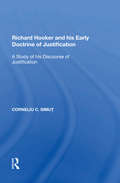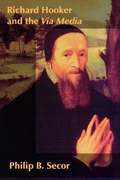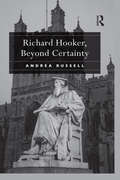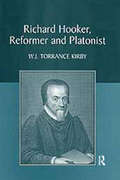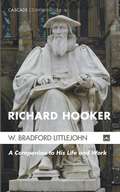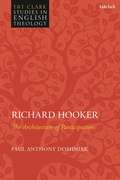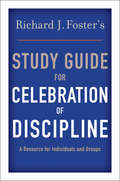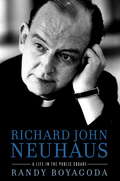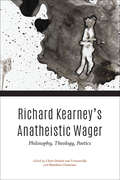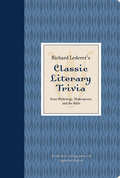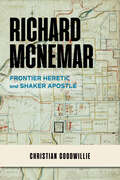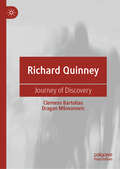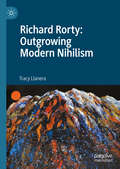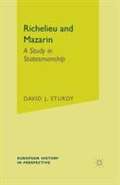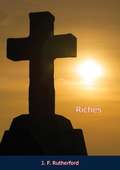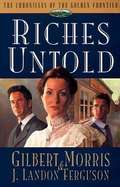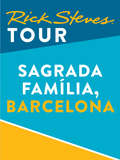- Table View
- List View
Rich in Love
by Lissa Halls Johnson Irene GarciaOne Step of Obedience Led to Thousands Irene and Domingo Garcia began their married lives at sixteen, already expecting a baby. Their first ten years together included Domingo's alcoholism and abuse, and Irene's desperate prayers for answers. Then a miracle happened: Domingo pleaded for forgiveness. As God healed their marriage, Irene and Domingo adopted a little girl. And a new season began for an imperfect couple who were willing to say yes to each other and to God. Over the past forty-five years, the Garcias have birthed, fostered, or adopted thirty-two children. Their story holds difficult endings as well as promising new beginnings. Above all, their story reminds us what can happen when ordinary people submit to God's call. Rich in Love is about a family cemented in hope. About a need to love the orphan. And about a God who never, ever gives up.
Rich in the Things That Count the Most
by James W. MooreWhile we may or may not be wealthy when it comes to material things, James W. Moore says, every one of us can be rich in the things that count the most. True happiness, fulfillment, and wealth come from knowing that God is with us, and from being grateful for all of the blessings God has given us. Through Scripture and compelling stories of faith, Moore invites us to explore the real riches in our lives, those things “that will last and endure, that won’t rust or corrode or become boring or go out of style.”Each chapter of the book features a key passage of Scripture and focuses on a key theme. A study guide is included.Chapter titles include “Rich in the Scriptures”; “Rich in Soul”; “Rich in Church”; “Rich in the Power of Life-Changing Words”; “Rich in Christian Freedom”; “Rich in Gratitude”; “Rich in Generosity”; “Rich in Friendship”; “Rich in Real Life”; “Rich in ‘Because Of’ Faith”; “Rich in Mind, Body, and Spirit”; “Rich in the Risen Christ”; “Rich in Easter Faith”; and “Rich in Commitment to Christ.”JAMES W. MOORE, popular speaker and preacher, is the author of Yes, Lord, I Have Sinned, But I Have Several Excellent Excuses; God Was Here and I Was Out to Lunch; When Grief Breaks Your Heart; There's a Hole in Your Soul That Only God Can Fill; and many other books. He and his wife, June, live in Fairview, Texas.
Richard Bancroft and Elizabethan Anti-Puritanism
by Patrick CollinsonThis major new study is an exploration of the Elizabethan Puritan movement through the eyes of its most determined and relentless opponent, Richard Bancroft, later Archbishop of Canterbury. It analyses his obsession with the perceived threat to the stability of the church and state presented by the advocates of radical presbyterian reform. The book forensically examines Bancroft's polemical tracts and archive of documents and letters, casting important new light on religious politics and culture. Focussing on the ways in which anti-Puritanism interacted with Puritanism, it also illuminates the process by which religious identities were forged in the early modern era. The final book of Patrick Collinson, the pre-eminent historian of sixteenth-century England, this is the culmination of a lifetime of seminal work on the English Reformation and its ramifications.
Richard Baxter's Reformed Liturgy: A Puritan Alternative to the Book of Common Prayer (Liturgy, Worship and Society Series)
by Glen J. SeggerThe English Civil War and its aftermath was a time of human devastation, political uncertainty and religious instability. Amid the turmoil of those times, however, the Church of England also saw intense liturgical inventiveness. The Directory for Public Worship, Jeremy Taylor's Communion Office, and Richard Baxter's Reformed Liturgy, are all examples of resourceful liturgies born out of the ashes of the English Civil War. The Church of England had not witnessed such liturgical innovation since Thomas Cranmer, and would not see such creativity again until the end of the twentieth century - at least in terms of liturgical texts. In Richard Baxter's Reformation of the Liturgy, Glen J. Segger examines the theology and ecclesiology of Baxter’s liturgical opus. While never approved for public use, the Reformed Liturgy remains an important and creative liturgy representative of those who fought for their Puritan convictions, but lost.
Richard Hooker and his Early Doctrine of Justification: A Study of his Discourse of Justification
by Corneliu C. SimutRichard Hooker and his Early Doctrine of Justification explores the doctrine of justification, the doctrine of faith and grace, and the doctrine of Scripture and use of reason in the early theology of Richard Hooker. In order to prove that Hooker was a Protestant Reformed theologian, Simuþ concentrates on Hooker‘s doctrine of justification as reflected in his Learned Discourse of Justification, which is the most important work of his early theology. Unlike previous books on Hooker which use primarily the theology of Luther and Calvin to draw conclusions, this book brings together quotations and ideas from the works of Luther, Melanchthon, Zwingli, Bucer, Calvin and Beza to show that Hooker was a Protestant Reformed theologian. Simuþ also discusses the theological context of Hooker‘s career by offering an analysis of the doctrine of justification in the theology of John Jewel, John Whitgift (Hooker‘s patrons), and Thomas Cartwright and Walter Travers (Hooker‘s Puritan opponents).
Richard Hooker and the Via Media
by Philip B. SecorRICHARD HOOKER (1554-1600) is the pioneer theologian of the Anglican/Episcopal religious tradition. To the present day, his advocacy of a broad tolerant middle way (via media) between the extremes of fundamentalist Protestantism and the more rigid expressions of Roman Catholicism is a hallmark of Anglicans and Episcopalians around the globe. For all of his importance, little has ever been known about Hooker's life and the manner in which his ideas developed. With the appearance of Dr. Secor's biography, thoroughly researched over many years, yet written in a style that makes Hooker accessible to the general reader, this great figure emerges at last into the light of history as a full-blooded Elizabethan character endowed with all of the very human strengths and weaknesses of that dynamic and formative age.
Richard Hooker, Beyond Certainty: Beyond Certainty
by Andrea RussellIn spite of the differing, and often conflicting interpretations, there have been several constants – beliefs about Hooker and his work – that have remained virtually unchallenged throughout the centuries. Richard Hooker, Beyond Certainty examines and calls into question three of these constants. The first to be challenged is the fundamental belief that Hooker is attached securely to the English Church and that their identities are so interwoven that to speak of one is to speak of the other. The second is that Hooker's prose – his unique writing style and powerful rhetoric – can be ignored in the process of assessing his theology. The third is the widely-held belief that, as the 'champion of reason', Hooker's faith is essentially rational and that God is perceived and experienced primarily through the intellect. Challenging the truth of each of these statements leads to an uncertainty about Hooker which, rather than negating scholarship, allows research to be liberated from the dominance of categorisation. Such a change, it is suggested, would acknowledge that Hooker's theology transcends Anglican studies and allows his radical thinking to reach a wider audience.
Richard Hooker, Reformer and Platonist
by W.J. Torrance KirbyThis book explores key aspects of Richard Hooker's philosophical and theological discourse in the context of currents of thought prevalent in the 'Magisterial Reformation' of the sixteenth century. Hooker's treatment of natural law, his dependence upon the philosophical discourse and traditional cosmology of Christian Neoplatonism, and his appeal to the authority of patristic sources, are all closely examined. <p><p> Challenging the received 'exceptionalist' model of much of the twentieth-century interpretation of Hooker, in particular the concept of his supposed defence of the English Reformation as striking a 'via media' between Rome and mainstream Protestant reform, W.J. Torrance Kirby argues that Hooker adheres to principles of 'magisterial' reform while building upon the assumptions of a distinctively Protestant version of Platonism.
Richard Hooker, Reformer and Platonist
by W.J. Torrance KirbyThis book explores key aspects of Richard Hooker's philosophical and theological discourse in the context of currents of thought prevalent in the 'Magisterial Reformation' of the sixteenth century. Hooker's treatment of natural law, his dependence upon the philosophical discourse and traditional cosmology of Christian Neoplatonism, and his appeal to the authority of patristic sources, are all closely examined. Challenging the received 'exceptionalist' model of much of the twentieth-century interpretation of Hooker, in particular the concept of his supposed defence of the English Reformation as striking a 'via media' between Rome and mainstream Protestant reform, W.J. Torrance Kirby argues that Hooker adheres to principles of 'magisterial' reform while building upon the assumptions of a distinctively Protestant version of Platonism.
Richard Hooker: A Companion To His Life And Work
by W. Bradford LittlejohnAlthough by common consent the greatest theologian of the Anglican tradition, Richard Hooker is little known in Protestant circles more generally, and increasingly neglected within the Anglican Communion. Although scholarship on Hooker has witnessed a dramatic renaissance within the last generation, thus far this has tended to make Hooker less, not more accessible to general audiences, and interpreters have been sharply divided on the meaning of his theology. This book aims to draw upon recent research in order to offer a fresh portrait of Hooker in his original historical context, one in which it had not yet occurred to any Englishman to assume the label Anglican, and to bring him to life for all branches of the contemporary church. Part One examines his life, writings, and reputation, puncturing several old myths along the way. Part Two seeks to establish Hooker's theological and pastoral vision, exploring why he wrote, how he wrote, whom he was seeking to persuade, and whom he was seeking to refute. Part Three analyzes key themes of Hooker's theology--Scripture, Law, Church, and Sacraments--and how they related to his late Reformation context. Finally, the concluding chapter proposes Hooker's method as a model for our confused contemporary age, combining fidelity to Scripture, historical awareness, and a pastorally sensitive pragmatism.
Richard Hooker: The Architecture of Participation (T&T Clark Studies in English Theology)
by Karen Kilby Stephen R. Holmes Mike Higton Paul Anthony DominiakRichard Hooker's Of the Laws of Ecclesiastical Polity has long been recognised as an influential philosophical, theological, and literary text. While scholars have commonly noted the presence of participatory language in selected passages of Hooker's Laws, no study to date has traced how participation lends a sense of system and coherency across the whole work. Paul Anthony Dominiak explores how the concept of participation informs and holds together Hooker's major work. <P><P> Dominiak analyses how Hooker uses an architectural framework of 'participation in God' to build a cohesive vision of the Elizabethan Church as the most fitting way to reconcile and lead English believers to the shared participation of God. Dominiak first explores Hooker's metaphysical architecture of participation in his accounts of law and the sacraments. He then traces how this architecture structures cognitive participation in God, as well as Hooker's political vision of the Church and Commonwealth. The volume culminates in a summary that shows how Hooker provides a salutary resource for modern ecumenical dialogue and contemporary political retrievals of participation.
Richard J. Foster's Study Guide for "Celebration of Discipline"
by Richard J. FosterBrief, incisive essays clarify key issues raised in Celebration of Discipline and encourage a fuller understanding and practice of the spiritual disciplines.
Richard John Neuhaus
by Randy BoyagodaA brilliant biography of one of the intellectual mavericks of 20th Century Catholicism. Richard John Neuhaus (1936-2009) was one of the most influential figures in American public life from the Civil Rights era to the War on Terror. His writing, activism, and connections to people of power in religion, politics, and culture secured a place for himself and his ideas at the center of recent American history. William F. Buckley, Jr. and John Kenneth Galbraith are comparable -- willing controversialists and prodigious writers adept at cultivating or castigating the powerful, while advancing lively arguments for the virtues and vices of the ongoing American experiment. But unlike Buckley and Galbraith, who have always been identified with singular political positions on the right and left, respectively, Neuhaus' life and ideas placed him at the vanguard of events and debates across the political and cultural spectrum. For instance, alongside Abraham Heschel and Daniel Berrigan, Neuhaus co-founded Clergy Concerned About Vietnam, in 1965. Forty years later, Neuhaus was the subject of a New York Review of Books article by Garry Wills, which cast him as a Rasputin of the far right, exerting dangerous influence in both the Vatican and the Bush White House. This book looks to examine Neuhaus's multi-faceted life and reveal to the public what made him tick and why.
Richard Kearney's Anatheistic Wager: Philosophy, Theology, Poetics (Indiana Series in the Philosophy of Religion)
by Chris Doude van Troostwijk Matthew ClementeThis anthology of fifteen essays provides a variety of critical perspectives on the influential ideas in Richard Kearney’s Anatheism.Blaise Pascal famously insisted that it was better to wager belief in God than to risk eternal damnation. More recently, the distinguished philosopher Richard Kearney has offered a wager of his own—the anatheistic wager, or return to God after the death of God. In this volume, an international group of contributors consider what Kearney’s spiritual wager means.This volume examines what is at stake with such a wager and what anatheism demands of the self and of others. The essays explore the dynamics of religious anatheistic performativity, its demarcations and limits, and its motives.A recent interview with Kearney focuses on crucial questions about philosophy, theology, and religious commitment. As a whole, this volume interprets and challenges Kearney’s philosophy of religion and its radical impact on contemporary views of God.
Richard Lederer's Classic Literary Trivia: From Mythology, Shakespeare, and the Bible
by Richard LedererIn this follow-up to Richard Lederer&’s Literary Trivia, the author delves into curious facts and anecdotes about mythology, Shakespeare, and the Bible. Through his numerous books and syndicated columns, Richard Lederer&’s infectious love of language and literature has inspired and intrigued readers for decades. Now the author of Lederer on Language and Anguished English delivers a volume full of fascinating trivia about some of Western literature&’s most foundational works. Here you will be able to test—and expand—your knowledge of the Bible, ancient Greek mythology, and the plays and poetry of William Shakespeare.
Richard McNemar: Frontier Heretic and Shaker Apostle
by Christian GoodwillieThe first biography of a key and complex American religious figure of the nineteenth century, considered by many to be the "father of Shaker literature." Richard McNemar (1770–1839) led a remarkable life, replete with twists and turns that influenced American religions in many ways during the early nineteenth century. Beginning as a Presbyterian minister in the Midwest, he took his preaching and the practice of his congregation in a radically different, evangelical "free will" direction during the Kentucky Revival. A cornerstone of his New Light church in Ohio was spontaneous physical movement and exhortations. After Shaker missionaries arrived, McNemar converted and soon played a prominent role in expanding and raising public awareness of their religion by founding Shaker communities in the Midwest, becoming the first Shaker published author and the most prolific composer of Shaker hymns.Split between two opposing religious traditions—an evangelical movement attracting tens of thousands and Shakerism, which drew only hundreds to its villages—Richard McNemar's life poses a challenge for any biographer. Christian Goodwillie's mastery of the archival records surrounding McNemar and the Shakers allows him to tell McNemar's story in a way that fully captures the complexity of the man and the scope of his enduring legacy in American religious history.
Richard Price and the Ethical Foundations of the American Revolution
by William Bernard PeachRichard Price was a loyal, although dissenting, subject of Great Britain who thought the British treatment of their colonies as wrong, not only prudentially, financially, economically, militarily, and politically, but, above all, morally wrong. He expressed these views in his first pamphlet early in 1776. It concluded with a plea for the cessation of hostilities by Great Britain and reconciliation. Its analyses, arguments, and conclusions, however, along with its admiration for the colonists, their moral position and qualities, could hardly fail to contribute to their reluctant recognition that there was no real alternative to independence. Price found some of his views not only misunderstood but vilified by negative critics in the ensuing controversy. So he wrote a second pamphlet which was published in early 1777. He expanded his analysis of liberty, extended its application to the war with America, and greatly expanded his discussion of the economic impact upon Great Britain. After the war, in 1784, he published a third pamphlet on the importance of the American Revolution and the means of making it a benefit to the world, appending an extensive letter from the Frenchman, Turgot. Implicitly the letter regards Price as a perceptive theorist of the revolution; explicitly it identifies the problems facing the prospective new nation and expresses a wish that it will fulfill its role s the hope of the world. Selections in the appendices present a part of the pamphlet controversy and the selection of correspondence shows how seriously Price was regarded by Revolutionary leaders.
Richard Quinney: Journey of Discovery (Palgrave Pioneers in Criminology)
by Clemens Bartollas Dragan MilovanovicThis book traces the life course of Richard Quinney, one of the most cited authors in the social sciences and a key figure in the development of critical criminology in the 70s, 80s and 90s. It provides a look into his personal thoughts in becoming a 'radical' criminologist and situates it in his various experiences, questioning, and shifts in his journey through life. Richard has contributed to a profound paradigm shift in criminology, beginning with his book, The Social Reality of Crime (1970), but also to peacemaking criminology as well as peace studies. He has also written several books via an autoethnography approach and has presented a number of photograph presentations for which he has received awards. It traces his early development on the family farm in Wisconsin to his travels in higher academe. It gives a personal perspective in becoming not only a radical criminologist, an accomplished writer in auto-ethnography, visual sociology, and photography but also how his continuous questioning of the meaning of it all came to fruition with profound insights about what it is to be human. The book will be inspirational to not only seasoned veterans in criminology, but also to emerging scholars, to undergrads and grads, showing them the struggles that come in 'making it'.
Richard Rorty: Outgrowing Modern Nihilism
by Tracy LlaneraThe book makes a new contribution to the contemporary debates on nihilism and the sacred. Drawing on an original interpretation of Richard Rorty’s writings, it challenges the orthodox treatment of nihilism as a malaise that human beings must overcome. Instead, nihilism should be framed as a problem for human culture to outgrow through pragmatism.
Richelieu and Mazarin: A Study in Statesmanship (European History In Perspective Ser.)
by David J. SturdyDrawing upon recent research and past studies, David J. Sturdy presents a concise, up-to-date analysis of the private and public careers of two of the most influential ministers in seventeenth-century France. Richelieu and Mazarin: - adopts a broadly chronological approach, interspersed with passages at relevant points which compare and contrast the key achievements of the two Cardinals - examines such central themes as the internal government of France, the ministers' conduct of foreign policy, and the nature of elite and popular resistance to their policies - explores the political ideas and strategies of Richelieu and Mazarin, the relations between the ministers and the Crown, and the patronage they exercised The book concludes with a comparative assessment of the significance of the two figures for the history of France.
Richer By India
by Myra ScovelRicher By India brings missionary work to life with direct personal impact. Here are the faces and places, the daily frustrations and rewards, the down-to-earth human realities of an American family's experiences in a far-off land, told with beautiful simplicity and with a rare poetic awareness. Some of the situations Myra Scovel describes are frightening, some are hilarious, all are of absorbing interest, because, right from the start, the author establishes contact with the reader.
Riches
by J. F. RutherfordInformation which will enable every person to realize in fullness the greatest desire and fondest hopes of humankind.Joseph Franklin Rutherford (November 8, 1869 – January 8, 1942), also known as Judge Rutherford, was the second president of the incorporated Watch Tower Bible and Tract Society of Pennsylvania. He played a primary role in the organization and doctrinal development of Jehovah’s Witnesses, which emerged from the Bible Student movement established by Charles Taze Russell.
Riches Untold (Chronicles of the Golden Frontier #1)
by Gilbert Morris J. Landon FergusonIn this title in The Chronicles of the Golden Frontier, young Jennifer DeSpain dreams of a better life in Nevada. Running a newspaper, she uncovers the dark side of the mining business and sets out on the dangerous road of making a difference.
Riches, Poverty, and the Faithful
by Mark D. MathewsIn the book of Revelation, John appeals to the faithful to avoid the temptations of wealth, which he connects with evil and disobedience within secular society. New Testament scholars have traditionally viewed his somewhat radical stance as a reaction to the social injustices and idolatry of the imperial Roman cults of the day. Mark D. Mathews argues that John's rejection of affluence was instead shaped by ideas in the Jewish literature of the Second Temple period which associated the rich with the wicked and viewed the poor as the righteous. Mathews explores how traditions preserved in the Epistle of Enoch and later Enochic texts played a formative role in shaping John's theological perspective. This book will be of interest to those researching poverty and wealth in early Christian communities and the relationship between the traditions preserved in the Dead Sea Scrolls and New Testament.
Rick Steves Tour: Sagrada Familia, Barcelona (Rick Steves Tour)
by Rick StevesRick Steves' Walks eBooks are straightforward, self-guided walking tours through some of Europe's most popular destinations, designed for easy reference on your mobile device or eReader. In Rick Steves' Tour: Sagrada Familia, Barcelona-for less than the price of a cappuccino-Rick shares his candid advice on how to get the most out of a visit to the church, including when to go, how much it costs, and what to keep an eye out for once you're there. With Rick's knowledgeable, humorous writing in hand, you'll also learn some interesting historical facts about the church along the way. Packed with indispensable tips and recommendations from America's expert on Europe, Rick Steves' Tour: Sagrada Familia, Barcelona is a tour guide in your pocket-and on your smartphone.
